Hats off to Facebook, er, Meta.
The company’s been a socio-political whipping horse for so long that it’s only fair to give Zuckerberg & Co their due. They’ve evolved. And the outcomes are palpable.
I wrote last summer about the dearth of political posts on Facebook, chalking it up to a general sense of cesspool fatigue. But that wasn’t the full story.
We need to look back further.
Facebook first began throttling political content in early 2021. Their line was drawn at insurrection, apparently. By 2022, political posts on the platform had been reduced by half.
Not coincidentally, in January before the 2020 election, the percentage of Americans who said they followed political news at least “somewhat closely” was at 90% (41% “very closely”). Those numbers climbed even higher a year later. Today, just 76% of U.S. adults are following politics (31% “very closely”). That’s a big drop, statistically speaking. People are also talking much less about politics with their friends and family.
The Correlation-Causation Police may yammer, but I stand behind my theory. With less political content in our Facebook feeds and fewer friends peddling it, our addiction faded.
The disease is by no means cured. Millions of people will fall off the wagon in the months ahead. For now, we’re in recovery. And that’s good.
You can argue that people veering away from politics is troublesome. “DON’T YOU KNOW DEMOCRACY IS IN PERIL?” You may be right. Still, the people who don’t believe that by now aren’t going to be persuaded by your Facebook rant. If the end of the world is near, at least I can be on speaking terms with my uncles.
There are other, real consequences. Less political content consumption equals less ad revenue for news organizations, equals less job security for journalists, equals a weakening of democracy. I get it. Civic-mindedness is essential. The pendulum needed to swing from its 2016-2021 extremes, though, and Facebook swung it.
It’s been easy to vilify Mark Zuckerberg at times. His mistakes had horrific consequences. I’m not suggesting we erect a statue for someone who merely extinguished a fire they started.
But we can empathize. I sure as hell wouldn’t have wanted to be responsible for decisions that could shake the foundation of democracy (or teen mental health) when I was in my 20s. I was an arrogant, narcissistic prick at that age. Thankfully, I didn’t have the most powerful manipulation tool in history at my fingertips.
The changes (and apologies) the older, wiser Zuckerberg has made are honorable and, for now, making a difference. He deserves some credit.
Kudos.
Here’s what we’re seeing:
Consumer confidence ticked up this week. After suffering its first downturn of 2024 two weeks ago, our Economic Sentiment Index had a modest upturn in the latest reading. The underlying numbers aren’t worth partying over. The boost came from two rising metrics: confidence in buying a home and major purchases, which were both in the dumper to begin with. Confidence in the job market, personal finances, and the overall U.S. economy all fell.
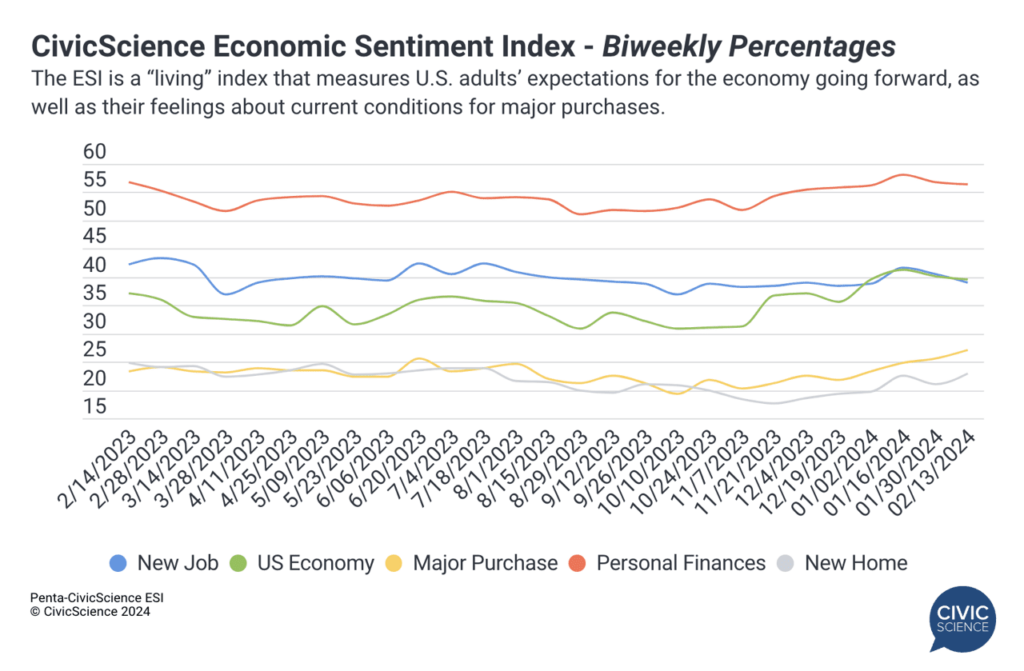
Americans are sleeping less. Since 2020, the number of Americans who get six or more hours of sleep on a typical night has fallen from 68% to 63% – meaning the percentage who get less than six hours has jumped five points. Maybe we’re stressed about inflation. Or maybe we’ve been staying out late, revenge-spending our money at bars. Either way, the correlation to our physical and emotional well-being has been undeniable. What we’ve been told forever is true – 8+ hours of sleep is gold (just not more than ten).
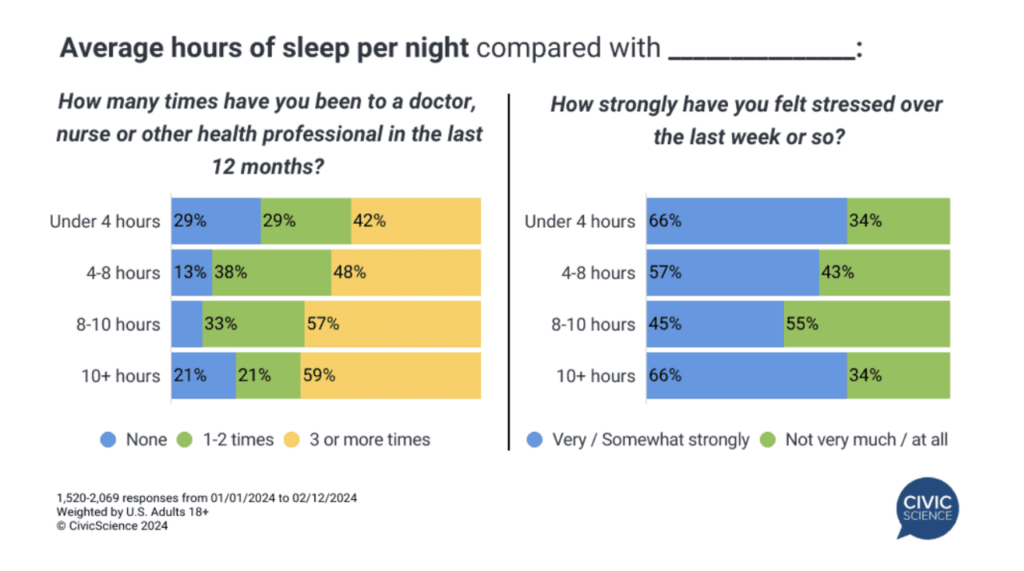
Super Bowl commercials work. It’s hard to fathom that dropping $7M on a 30-second ad would pay real dividends, but here we are. In our analysis of various brands that advertised during the Super Bowl, the increase in purchase intent was undeniable. Among consumer goods companies, NYX Professional Makeup saw a 61% jump in people who said they were likely to purchase the brand – admittedly because they were among the least-known brands on the list. In all, ten brands, from Michelob Ultra to e.l.f. Cosmetics saw at least a 25% increase. Among service companies, Uber Eats was the big winner. Temu, despite spending a fortune, was a distant third.
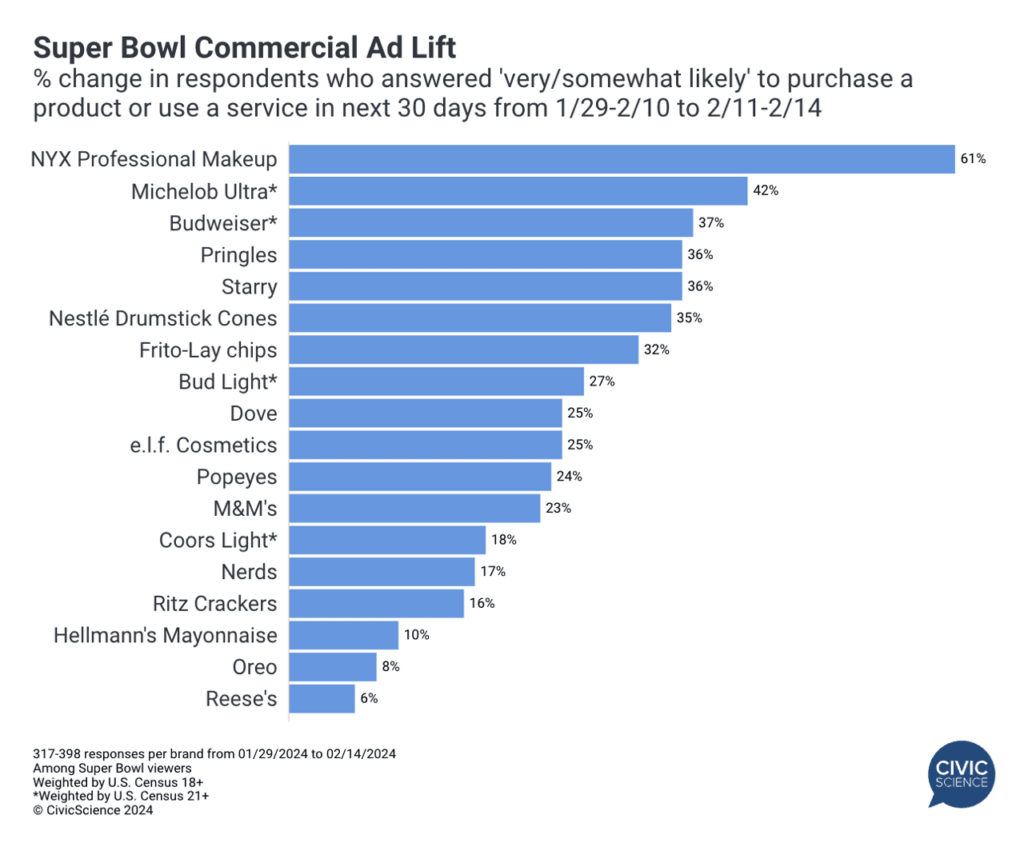
Fewer Americans plan to use their tax refunds to pay down debt. This one surprised (and concerned) me. Given the rising credit card debt and student loans hitting U.S. households, you’d think more found money would go to paying them down. But that doesn’t seem to be the plan. Also in our 3 Things to Know this week, we highlighted the remarkable discontinuity between levels of cancer concern and frequency of cancer screenings among U.S. adults, while looking at the growing number of Americans who are cutting back on live sporting events because of rising prices.
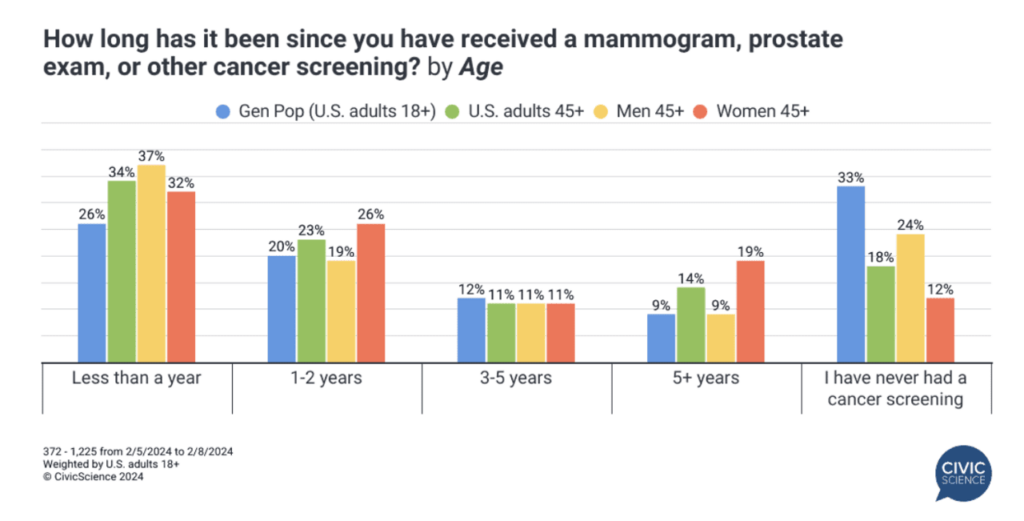
Gen Z grocery shoppers are changing the category landscape. The youngest U.S. adults are a fascinating case study in discriminating, strategic grocery buying. They’re far more likely than other age groups to shop at as many as three different stores (must be nice to have that time on their hands) and the least likely by far to patronize a regional grocery chain. Like most adults, they’re recoiling at rising prices but much more likely to cut back in areas like produce and beverages. They remain significantly more brand-centric than average; however, they’re 21% more likely to buy store-brand items than they were a year ago.
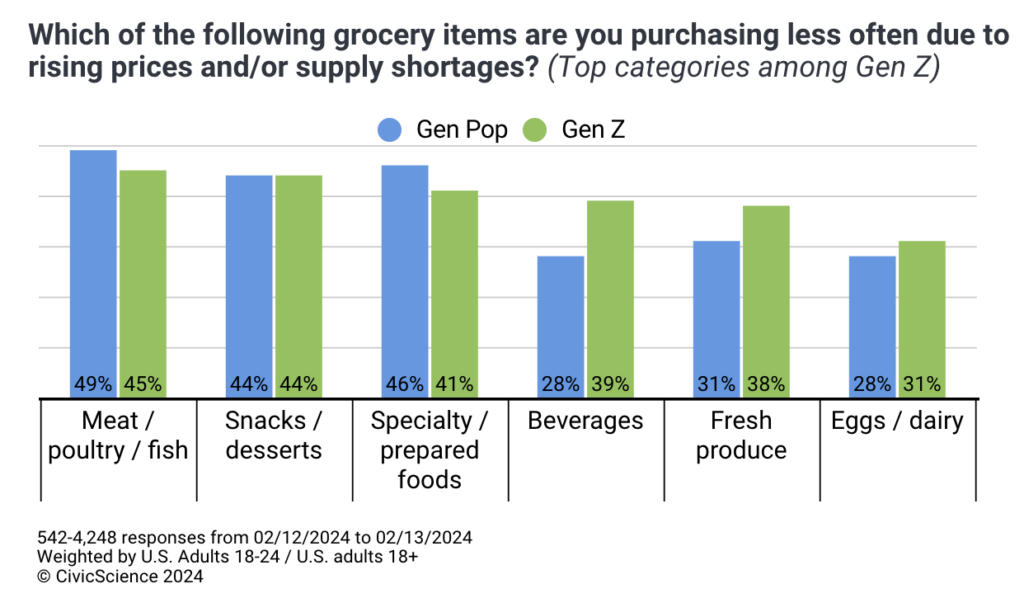
More awesomeness from the InsightStore™:
- Institutional trust keeps falling, and other appetizers from our latest Election Mindset Tracker;
- Customer loyalty programs are growing in popularity, but with remarkable differences among age groups and political party affiliations;
- Walmart’s rumored acquisition of Vizio would be a great move, but too bad they couldn’t pull off a deal for LG instead;
- Cash App is creeping up on PayPal, particularly among Gen Z and prolific spenders.
The most popular questions this week:
How would you rank Usher’s Super Bowl Halftime Show?
Have you ever tried to write a song?
Do you typically abstain from something during Lent?
Which of these generations has the *best* slang?
Would you say your style matches your significant other’s style?
Answer Key: Better than most; Yes, unsuccessfully; No; Gen X of course; If hoodies and sweatpants count as style, yes.
Hoping you’re well.
JD
Sign up for a free seven-day trial of our Sage AI-powered consumer analytics assistant, which lets you explore our database of 5+ billion insights and 600,000+ questions.
Was this email forwarded to you? Sign up here. If you are new to this list, check out our Top Ten to get caught up.
In case you’re wondering, I write this informal email to CivicScience clients, friends, and other VIPs every Saturday morning. If you’re getting this, you’re either one of those people or were referred to me by one of them. I always love your comments and feedback.
CivicScience Podcast | LinkedIn | Twitter | Email Archive | Answer Polls








